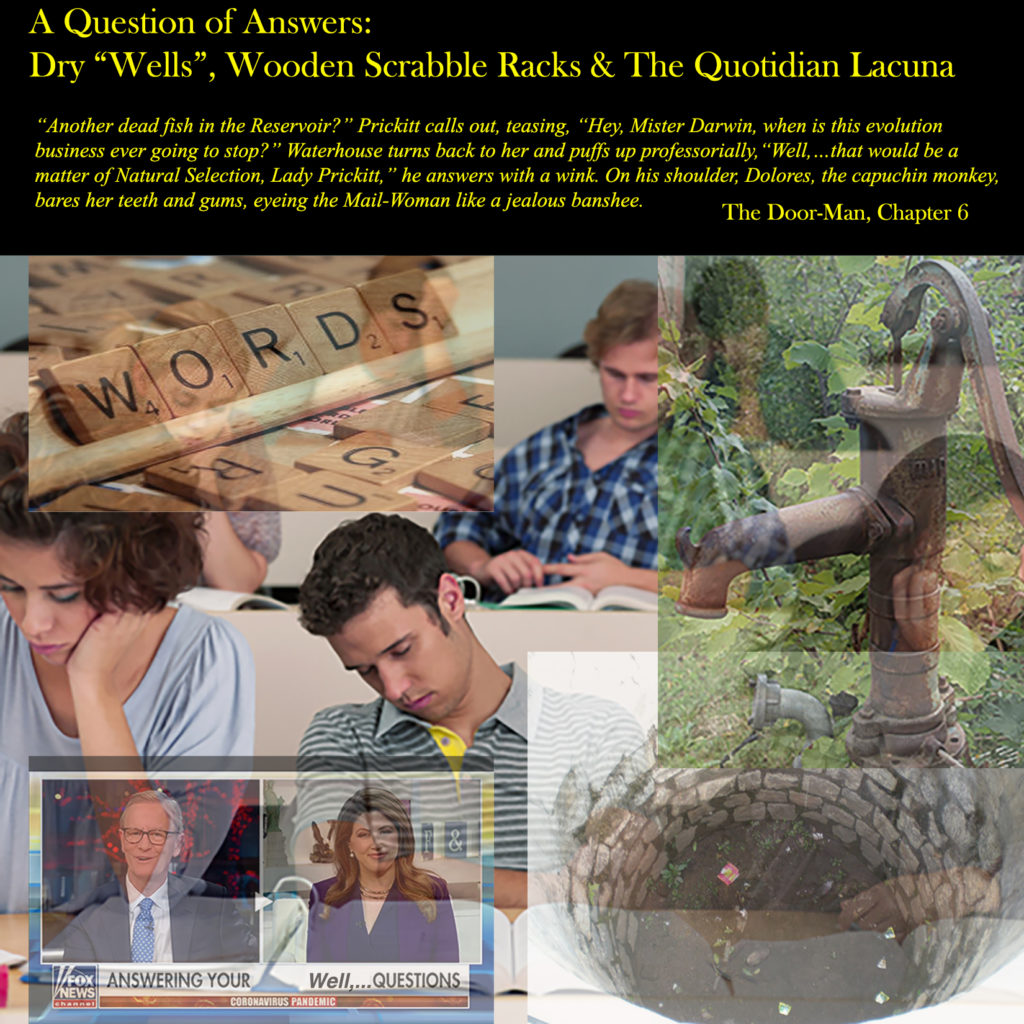
One of the great skills I learned as a professor was knowing how to speak while thinking of what to say. It’s the dirty little secret that most, if not all, academics share.
And it remains a secret because if we let that cat out of the bag (…or if a real cat got my tongue) that sleepy back-row student whose head keeps jerking up and down like a well hand-pump would be joined by a lecture hall full of bobble heads.
But speaking of hand-pumps, what about the wells? Not the ones that make you miss your water when it runs dry, but the word “well“…and the role it plays in the lacuna between pondering sense and making sense.
Like many phatic utterances* in everyone’s daily discourse, it’s a simple word doing difficult duty.
Ask anyone a question that requires a modicum of thoughtfulness and, more than likely, the first word out of their mouth will be “Well,…” (note: the comma and ellipses
aren’t actually part of the word’s phonemes, they’re just suggesting the stalling tactics involved).
And the word is, indeed, a bit of stall. It’s not that we don’t know the answer, it’s just that we need a moment to figure out how to say it. Think of Scrabble upping its game from combining letters into words to combining words into sentences. Instead of organizing letters on your wooden rack, you’re organizing words in your boney head.
And context is everything. It sets the table for how the word will be said…and heard.
For example, answering a friend’s question offers a comfortable space for an idle response, or forgiveness for an even greater stall:
“Well,…now that you ask, I’ll have to give that some more thought.”
On the other hand, answering the state trooper leaning into your car window offers only an uncomfortable squirt of adrenaline as you stare stupidly at your quiescent odometer:
“Well,…I’m not exactly sure, officer.”
And context is not solely about your interlocutors, it’s also about the type of questions asked. Different questions elicit different tonal versions of the word.
For example, when a chuckleheaded question ushers in the word with a dismissive gust of air:
“H-whehll!,…you might want to re-think that question.”
Or the (only slightly more generous) snicker, also for being asked a chuckleheaded question:
“Wheh-hell, heh, heh,…you might want to re-think that question.”
Not sure I spelled things quite right, but you get the point – both have the enunciative effect of stretching out the expanse of a one syllable word and turning it into a cudgel.
Here’s another example.
Tune in to a Capitol Hill reporter questioning a politician. Politicians use “Well,…” incessantly and of necessity, not because they’re trying to make sense with their answer, but just the opposite. They have the formidable task of providing an answer that seems to make sense from complete nonsense, and a long lingering “Well,…………” often buys enough time until the next election.
While I’ll wager that Fox News has more dissemblers of this sort than other news channels, one would not come up empty on any of them. Try an experiment. I did. Listen in on a news interview with a guest panel. The “wells…” never run dry.
Let me leave you with a final observation about the word – the one where it cannot get enough of itself and, so, doubles…er, triples down on things:
“Well, well, well,…”
The stall here is not meant for an answer but, rather, to help you recover from the unsettling surprise that someone you haven’t seen for awhile is standing now – for better or worse – before you:
“Well, well, well,…look who’s here.”
This triplet really buys you time. You’re given a long moment to silently count the days since last seeing your ol’ faculty colleague,…or a chance to map your get-away from that sleepy student in the back-row who seems to have graduated after all. And, again, context matters. Your cadence speeds up with a lilt in the former case and slows to a worrisome drawl in the latter.
I don’t know why this word caught my ruminative attention. Perhaps it was the thought that all of us – not just the professors in the room – know how to speak while thinking of what to say. All it takes is knowing how to speak “well,...”.
* If interested, you can read an earlier irreverent nod to phatic utterances: https://www.peterwheelwright.com/now-dont-get-me-wrong-truth-honesty-and-subway-phatics/
Return to Ruminations







